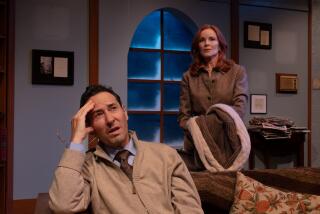Review: Seduced by Ayad Akhtarâs âJunk,â the new play that picks apart the Wall Street playbook
Reporting from LA JOLLA â Forget about all the TV pundits and op-ed columnists droning on about Americaâs problems. Playwright Ayad Akhtar is the diagnostician the nation needs to interpret its faltering health.
In his Pulitzer Prize-winning âDisgraced,â which was presented earlier this summer at the Mark Taper Forum, Akhtar tackled the American-Islamic relationship in the fraught post-9/11 era. This dinner-party drama, set in an upscale New York apartment, pitted political correctness against reactionary conservatism, exposing the hypocrisies on both sides as the polite conversation spiraled into a rhetorical (and literal) bloodbath.
In âJunk: The Golden Age of Debt,â his thrilling new play, which is receiving its world premiere here at La Jolla Playhouse, Akhtar takes on the equally explosive subjects of modern finance and the new religion of money. And once again he provides an unflinchingly candid cross section of attitudes and positions in which our sympathies and antipathies keep shifting along lines that are too complex to be straightforwardly ideological.
Part Shakespearean history play, part âThe Big Short,â âJunkâ tells the story of how debt overtook value as the path to enormous wealth. Set in 1985 when U.S. manufacturing was in stark decline and junk-bond financing was the new amphetamine designed to inject vitality into the countryâs economic bloodstream, the play focuses on a point of momentous transition in our financial system.
If this topic seems more suitable for a CNBC investigation than a stage play, let me assure you that Akhtarâs handling â brisk, lucid and at times highly suspenseful â is dramatically enthralling. The production, directed by Doug Hughes with the precision of a chess master, never loses steam as it moves from the boardroom to the bedroom to the backroom, where the most fateful deals are ultimately determined.
Judy Chen (Jennifer Ikeda), a business journalist writing about the new financial upstarts revising not only Wall Streetâs playbook but also Main Streetâs, launches this theatrical exposĂŠ of the new breed of kings, those ruthless, business-school-educated parvenus âbedecked in Brooks Brothers and Brioni, enthroned in sky-high castles on opposing coasts, embroiled in a battle over, well, yes, money.â
The question that consumes her concerns greed: âWhen did money become the thing? I mean the only thing. Upgrade your place in line â or your prison cell. ⌠Buy a strangerâs life insurance policy â pay the premium until they die and then collect the benefit. Oh, and cash. How much does it cost now just to get cash?â
At the center of her investigation is Robert Merkin (Josh Cooke), whom Time magazine put on its cover with the headline: âAmericaâs Alchemist. Debt Becomes an Asset.â Merkin is the brains of a Beverly Hills investment bank that has been deploying a strategy of hostile takeovers.
His junk-bond strategy is viewed as vulgar by WASP industrialists who canât believe the new landscape in which Jewish financiers such as Merkin and his associate Israel Peterman (Matthew Rauch) can plunder venerable, if suddenly vulnerable, manufacturing firms that make a tangible contribution to the American economy. (These bluebloods, arrogant, self-entitled and unthinkingly bigoted, donât appreciate outsiders encroaching on their aristocratic turf.)
Thomas Everson (Linus Roache), a country club swell who has been trying to keep Everson Steel and United together during a period of rising labor costs and increased competition from China, now faces a more pernicious threat from Merkinâs team, which has mobilized to conquer the business his family built.
An alliance with Leo Tresler (David Rasche), a private-equity magnate who wants to destroy the junk-bond barbarians at the gate, is all that stands in the way of Everson and his workers losing their livelihoods.
Much of the plot of âJunkâ concerns the machinations of this business battle. The cast of characters, which includes double-crossing lawyers, a U.S. attorney and arbitrageurs galore, represents a modern-day version of the barons jockeying for the crown in Shakespeareâs English histories.
Merkin could stand as the playâs protagonist, but âJunkâ is really an ensemble piece. There isnât an overwhelming theatrical presence, which would be a weakness were the portrayals not so realistically convincing.
âThe Big Short,â which was based on real-life figures, turned its financiers into a band of outlandish eccentrics. The film was chockablock with characters. âJunk,â which is more freely imagined, not stemming from one dominant nonfiction source, seems by contrast populated with actual business people.
Cookeâs Merkin is attractively bland. He doesnât want the spotlight, which would only invite undue scrutiny of his questionable business practices. Heâs a free market evangelist who understands that globalization has changed the American economy for good â and thereâs no point in deluding ourselves otherwise.
Akhtar has a provocative way of putting truth in the mouths of his devils. There are no saints, but the good guys and gals are skilled at self-deception. Money drives everyone to extremes.
Whatâs most impressive about âJunkâ is the brilliant way Akhtar crunches the social, political and economic data of this greedy new world, a precursor to the way we live today. The play ensnares you with the reach and penetration of its thinking.
In truth, the intellectual synthesis is ultimately more seductive than the story itself. Akhtar comes up short when he tries to psychologically account for motivations or when he grows philosophical about the boundlessness of desire. But the play is spot-on in its understanding of the way ethics and economics bleed into each other.
Unfolding on a split-level set designed by John Lee Beatty that is divided into cubicle-like rooms partitioned with mirrors, the play moves at an epic clip from L.A. to New York to the steel mills of Reading, Penn. The ambience, intensified by Ben Stantonâs lighting, remains darkly, almost menacingly corporate.
In âJunk,â Akhtar has written a modern-day morality tale that scrupulously questions the possibility of moral choice in a world where money, the new might, now makes right.
------------
âJunk: The Golden Age of Debtâ
Where: La Jolla Playhouse, 2910 La Jolla Village Drive, La Jolla
When: 7:30 p.m. Tuesdays-Wednesdays, 8 p.m. Thursdays-Fridays, 2 and 8 p.m. Saturdays, 2 and 7 p.m. Sundays. Ends Aug. 21
Tickets: Start at $20
Info: (858) 550-1010 or www.lajollaplayhouse.org
Running time: 2 hours, 30 minutes
ALSO
âA sickness in this countryâ: Pulitzer winner Ayad Akhtar on capitalismâs cruelties
Akhtarâs âDisgracedâ at the Taper: Islam, America and the cloudy prism of perception
Why the Rio Olympics opening ceremony matters
Tennessee Williams: What three lesser known works say about the playwrightâs legacy
Barbra Streisand, still gunning for âGypsy,â samples some Stephen Sondheim at Staples Center
More to Read
The biggest entertainment stories
Get our big stories about Hollywood, film, television, music, arts, culture and more right in your inbox as soon as they publish.
You may occasionally receive promotional content from the Los Angeles Times.











